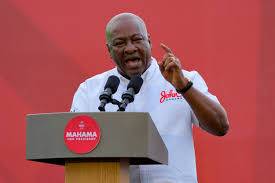John Mahama and Ghana's IMF Journey: A Recurrent Debate
In the realm of Ghanaian politics, the mention of the International Monetary Fund (IMF) inevitably sparks heated debates, especially when the country faces economic turbulence. Former President John Dramani Mahama, who is vying for another shot at the presidency, is once again at the center of discussions about Ghana's reliance on the IMF. With his political opponents accusing him of a history of frequent IMF bailouts, the narrative is gaining traction that Mahama’s leadership may lead Ghana back to the IMF after the current economic vetting processes.
Ghana's Historical Engagement with the IMF
Ghana's relationship with the IMF dates back to the 1960s, shortly after gaining independence. The country has since engaged with the IMF on multiple occasions to stabilize its economy, particularly during periods of fiscal deficits, mounting debts, and declining currency value. John Mahama's tenure as President from 2012 to 2016 saw Ghana approach the IMF for a $918 million Extended Credit Facility in 2015. This decision was necessitated by challenges such as falling commodity prices, a depreciating cedi, and unsustainable debt levels.
The IMF program during Mahama's administration aimed to restore fiscal discipline, reduce inflation, and boost economic growth. However, critics argue that it came with stringent austerity measures that strained the average Ghanaian and stifled certain sectors of the economy. This narrative has been a tool for Mahama's political adversaries, who often cite his reliance on the IMF as evidence of poor economic management.
The Current Economic Landscape
Under the current administration of President Nana Addo Dankwa Akufo-Addo, Ghana returned to the IMF in 2022, securing a $3 billion bailout amid one of the country's worst economic crises in decades. High inflation, a depreciating currency, and unsustainable debt levels have pushed Ghana back to seeking external financial support. This recent IMF engagement, though initiated by the New Patriotic Party (NPP) government, has reignited discussions about the sustainability of Ghana's economic strategies.
Critics of the current administration argue that the country's challenges stem from mismanagement and excessive borrowing. Supporters of Mahama claim that he has the experience and insight to navigate such economic hurdles, given his previous tenure. However, opponents fear that Mahama's return could mean another cycle of IMF dependency, especially if his administration fails to implement long-term structural reforms.
Mahama’s Economic Vision
In his campaign for the 2024 elections, Mahama has consistently emphasized the need for a new economic paradigm. He advocates for diversification of the economy, a focus on industrialization, and a more robust management of public finances. His promises include reducing wasteful spending, increasing revenue mobilization, and ensuring that Ghanaian resources benefit the people.
However, the question remains: can Mahama deliver on these promises without resorting to another IMF program? Some experts argue that Ghana's current economic challenges require a leader who can implement bold and innovative policies. They note that while IMF programs provide temporary relief, they often come with conditions that may hinder long-term growth. Mahama's ability to balance these competing demands will be critical if he regains the presidency.
Political Ramifications
The prospect of Mahama leading Ghana back to the IMF is both a political weapon and a point of contention. For the NPP, it is an opportunity to frame Mahama as a leader who cannot manage the economy without external help. For the National Democratic Congress (NDC), it is a chance to highlight the failures of the current administration and position Mahama as a leader capable of steering the country out of crisis.
The debate also reflects broader concerns about Ghana's economic trajectory. Successive governments have struggled to break the cycle of borrowing and dependency, raising questions about the sustainability of the country's fiscal policies. Regardless of who wins the 2024 elections, the next administration will face immense pressure to address these challenges and reduce Ghana's reliance on external support.
Conclusion
As Ghana gears up for the 2024 elections, the issue of IMF dependency will remain central to political discourse. John Mahama's track record and his vision for the future will be scrutinized by both supporters and critics. While his leadership experience provides a sense of familiarity, concerns about a potential return to the IMF underscore the complexities of Ghana's economic challenges.
The choice facing Ghanaians is not just about political allegiance but also about the direction of the country's economy. Whether Mahama can convince the electorate that he holds the key to Ghana's economic recovery without another IMF bailout will be a defining factor in his campaign. Only time will tell if his promises resonate with the aspirations of the people.




No comments yet
Be the first to share your thoughts!